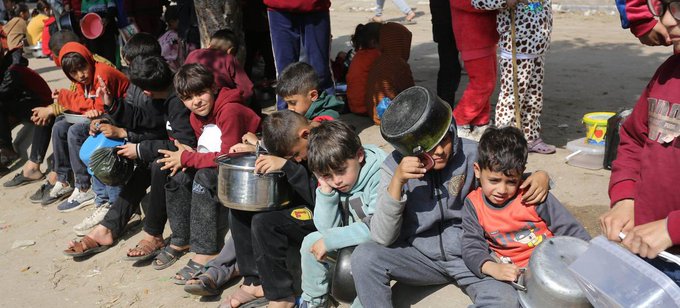Shibh aljazeera Net | Gaza
The specter of famine hangs over northern Gaza, with recent UN reports warning of a worst-case scenario in the northern areas due to escalating Israeli bombardment, fierce battles, and the halt of food aid caused by Israeli restrictions.
According to a report seen by Boqash, the UN states that the risk of famine is imminent and severe, with the situation in Gaza deteriorating rapidly. It’s possible that famine thresholds have already been breached or will be very soon.
In October, the UN Famine Review Committee anticipated that the number of people in Gaza facing “catastrophic” food insecurity could reach 345,000, or 16% of the population, between November this year and April 2025.
Conditions have worsened in northern Gaza amid the collapse of food systems, a decrease or total cessation of humanitarian aid, and critical water, sanitation, and hygiene conditions. Consequently, the UN assumes that famine, malnutrition, and excess mortality due to hunger and disease are rapidly increasing in these areas.
Sharp Price Increases
Since October 6, 2024, the Israeli military has been conducting an air and ground assault in northern Gaza, particularly in areas such as Jabalia, Beit Lahia, and Beit Hanoun, while permitted aid shipments have reached their lowest levels since October 2023.
Food access in Gaza is deteriorating due to a sharp rise in the prices of essential goods on the black market. According to the UN report, the price of cooking gas has surged by 2,612%, diesel by 1,315%, and wood by 250%.
With soaring prices, livelihoods are collapsing, making it nearly impossible to buy or barter for food and other essentials. Children, women, and men are queuing in camps in central Gaza for food, as reported by Boqash.
According to the Gaza Consumer Price Index, there has been an unprecedented 283% increase in the index, as reported by the Palestinian Central Bureau of Statistics.
Many residents have been forced to sell their clothes, including their children’s, to buy a few vegetables or loaves of bread due to the severe inflation. Locals report that a single tomato now costs approximately three dollars in central and southern Gaza, while it remains unavailable in the north amid the ongoing Israeli invasion.
UNRWA Ban Worsens Conditions
Israel has officially informed the UN of the cancellation of its agreement with the UN Relief and Works Agency (UNRWA) for Palestinian Refugees, following its approval by the Israeli Knesset. The UN expressed concern, warning of “extremely serious consequences for humanitarian operations.”
Israeli criticisms and measures against UNRWA, which plays a critical role in the deteriorating Palestinian situation, have intensified. Israel has accused several UNRWA employees of involvement in the October 7, 2023 attack, although investigations found no evidence supporting these claims.
Israel has killed at least 220 Palestinian UNRWA employees and destroyed two-thirds of UNRWA facilities in Gaza during the year-long conflict. Israel concluded its actions against the agency by banning its activities in Israeli-controlled areas.
The Israeli ban on UNRWA activities could lead to the collapse of humanitarian work in Gaza, according to the UN. UNRWA spokesperson Jonathan Fowler stated that implementing this law would mean the collapse of the international humanitarian operation in the Strip, where UNRWA serves as the backbone.
The Israeli decision cancels a 1967 agreement that allowed UNRWA to operate in Israel. Halting the agency’s activities would also end its operations in the West Bank and prohibit any contact between Israelis and UNRWA employees.
